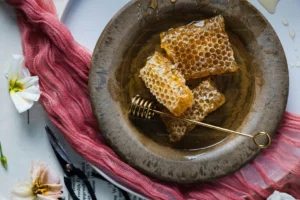Table of Contents
Honey vs. Sugar: Which is Better?
When it comes to adding sweetness to your cup of tea or any other beverage, you may wonder whether honey or sugar is the healthier choice. While it is generally advised to limit your consumption of sweeteners, honey is often considered the better option compared to sugar. In this article, we will explore the nutritional benefits of honey and sugar, and discuss why honey is often regarded as a healthier alternative.
Honey Basics
Honey is a natural sweetener produced by bees using the nectar they collect from flowers. It is a thick liquid that can range in color from pale yellow to dark brown. Composed primarily of water, fructose, and glucose, honey also contains trace amounts of enzymes, amino acids, B vitamins, vitamin C, minerals, and antioxidants. These antioxidants, known as flavonoids, have anti-inflammatory properties that may offer some health benefits. The nutritional composition of honey can vary depending on its origin, with over 300 varieties available including alfalfa, wildflower, tupelo, golden blossom, and eucalyptus honey. Each variety has its own distinct color and flavor. However, it is important to note that all types of honey can still spike blood sugar levels.
The Benefits of Honey
Honey offers several potential benefits when used in moderation:
-
Less is More: Honey is sweeter than sugar, which means you can use a smaller amount of honey to achieve the desired level of sweetness in your food or drink.
-
Vitamins and Minerals: Although the amounts are small, honey does contain trace amounts of vitamins and minerals, which may provide some added health benefits.
-
Allergy Alleviation: Raw, unpasteurized honey contains local pollen, which may help desensitize allergic reactions in some individuals.
-
Antimicrobial Properties: Honey has antimicrobial properties that may help kill off germs.
-
Healing Properties: When used as a gel salve, honey may promote the healing of wounds and minor burns.
-
Cough and Sore Throat Relief: Honey has been traditionally used to ease coughing and soothe sore throats.
Overall, honey goes through less processing than sugar and can be eaten raw. However, it is important to note that honey is slightly higher in calories per serving than sucrose (table sugar) and should be used sparingly. Additionally, honey is not recommended for infants younger than 1 year due to the risk of botulism.
Sugar Basics
Sugar, on the other hand, is a combination of glucose and fructose that forms sucrose. It is a calorie-dense carbohydrate derived from sugar beet and sugar cane plants. Sugar undergoes multistep processing to become the refined, granulated table sugar that is commonly used. There are different types of sugar available, including white, brown, raw, powdered, turbinado, and muscovado sugar. While brown sugar may contain some trace nutrients due to the addition of molasses, raw sugar does not differ nutritionally from white sugar.
The Benefits of Sugar
Sugar does offer a few advantages:
-
Naturally Occurring Substance: Sugar is a naturally occurring substance that provides a quick source of fuel for your body.
-
Lower in Calories: Compared to honey, sugar is lower in calories per serving.
-
Long Shelf Life: White sugar has a long shelf life and is easy to use in various cooking and baking recipes.
However, it is essential to consider the downsides of consuming excessive amounts of sugar.
The Downsides of Sugar
Consuming too much sugar can have negative effects on your health:
-
Increased Disease Risk: Excessive sugar consumption is associated with an increased risk of heart disease and type 2 diabetes.
-
Weight Gain: Sugar is calorie-dense and can contribute to weight gain and obesity.
-
Energy Spikes and Drops: Large amounts of sugar can cause your energy levels to rise and drop sharply.
It’s important to be mindful of your sugar intake, especially if you have health concerns such as diabetes, heart disease, or obesity.
Tips for Reducing Sweetener Consumption
If you want to cut down on your overall sweetener consumption, here are a few tips:
-
Start Small: Gradually reduce the amount of sweetener you use in your beverages, such as tea or coffee. For example, try using half a teaspoon of honey or half a packet of sugar instead of a full serving.
-
Be Mindful of Portions: Measure out the amount of sweetener you add to your food or drinks to avoid overindulging.
-
Experiment with Other Flavorings: Explore alternative ways to add flavor to your food and beverages, such as using herbs, spices, or citrus fruits.
-
Reduce Sugar in Baking: If you use sugar in baking, try reducing the amount by one-third. In many recipes, this reduction may have less impact on taste than you might expect.
In conclusion, while honey is often considered a healthier option compared to sugar due to its potential nutritional benefits and lower calorie content, it is still important to consume it in moderation. Both honey and sugar can contribute to weight gain if overused, and individuals with specific health concerns should be mindful of their consumption. By reducing your overall intake of sweeteners and exploring alternative ways to add flavor to your food and drinks, you can make healthier choices while still satisfying your sweet tooth.



